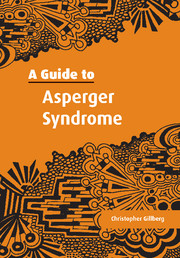Book contents
- Frontmatter
- Contents
- Preface
- 1 Introduction
- 2 Definitions
- 3 Prevalence
- 4 Symptoms in childhood
- 5 Symptoms in adolescence
- 6 Associated psychiatric and social problems
- 7 Other problems
- 8 Strengths
- 9 Background factors
- 10 Cognitive neuropsychology
- 11 Diagnosis and work-up
- 12 Outcome in the longer term: adults with Asperger syndrome
- 13 Attitudes, interventions and treatment
- 14 Who can help?
- 15 What about all those famous geniuses?
- 16 Case vignettes
- Appendices
- Further reading
- Index
1 - Introduction
Published online by Cambridge University Press: 04 September 2009
- Frontmatter
- Contents
- Preface
- 1 Introduction
- 2 Definitions
- 3 Prevalence
- 4 Symptoms in childhood
- 5 Symptoms in adolescence
- 6 Associated psychiatric and social problems
- 7 Other problems
- 8 Strengths
- 9 Background factors
- 10 Cognitive neuropsychology
- 11 Diagnosis and work-up
- 12 Outcome in the longer term: adults with Asperger syndrome
- 13 Attitudes, interventions and treatment
- 14 Who can help?
- 15 What about all those famous geniuses?
- 16 Case vignettes
- Appendices
- Further reading
- Index
Summary
Hans Asperger appears to have been unaware of the writings of Ewa Ssucharewa when he published his first paper on the condition that he referred to as ‘autistic psychopathy’ in 1944. Indeed, there is no indication that he ever learnt about the 1926 publication by the Russian neurology scientific assistant about a condition that she referred to as ‘schizoid personality of childhood’. Reading Asperger's case histories on boys with ‘autistic personality disorder’ (which is really what is meant by ‘autistic psychopathy’) and Ssucharewa's on boys with ‘schizoid personality disorder’, one is struck by the great similarity rather than by any major difference. It seems clear that the two physicians were really describing the same phenomenon. However, Ssucharewa's publication was not brought to the attention of the international research community until 1995 (by Sula Wolff, a Scottish psychiatrist). Asperger's report had been widely cited long before that – and most notably by Lorna Wing, the British autism expert – and so his name has become attached to the syndrome.
It is of historical interest that Leo Kanner, the US psychiatrist who first reported on the ‘classic’ variant of childhood autism as a syndrome in 1943, never once mentioned Asperger, but did refer, albeit in passing (in 1971) to Ssucharewa. Asperger, on the other hand, referred to Kanner, but felt that ‘autistic psychopathy’ was clearly different from the syndrome that Kanner had described.
- Type
- Chapter
- Information
- A Guide to Asperger Syndrome , pp. 1 - 4Publisher: Cambridge University PressPrint publication year: 2002



